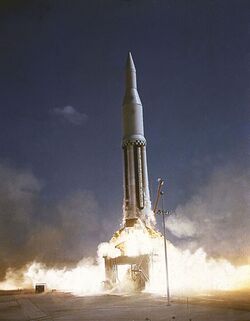Earth:Project Highwater
Project Highwater was an experiment carried out as part of two of the test flights of NASA's Saturn I launch vehicle (using battleship upper stages), successfully launched into a sub-orbital trajectory from Cape Canaveral, Florida. The Highwater experiment sought to determine the effect of a large volume of water suddenly released into the ionosphere.[1][2] The project answered questions about the effect of the diffusion of propellants in the event that a rocket was destroyed at high altitude.[3]
The first flight, SA-2, took place on April 25, 1962. After the flight test of the rocket was complete and first stage shutdown occurred, explosive charges on the dummy upper stages destroyed the rocket and released 23,000 US gallons (87,000 L) of ballast water weighing 95 short tons (86,000 kg) into the upper atmosphere at an altitude of 65 miles (105 km),[4] eventually reaching an apex of 90 miles (145 km).[3]
The second flight, SA-3, launched on November 16, 1962, and involved the same payload. The ballast water was explosively released at the flight's peak altitude of 104 miles (167 km).[5][6] For both of these experiments, the resulting ice clouds expanded to several miles in diameter and lightning-like radio disturbances were recorded.[3][4]
See also
- High-altitude nuclear explosion - other high altitude explosive tests
References
- ↑ von Ofenheim, Bill (January 20, 2004). "Saturn I SA-2 Launch". NASA Scientific and Technical Information Program. Archived from the original on May 17, 2011. https://web.archive.org/web/20110517155438/http://nix.ksc.nasa.gov/info;jsessionid=2916kf84ibbt0?id=MSFC-6203276&orgid=11. Retrieved July 2, 2009.
- ↑ Wade, Mark. "Highwater". Astronautix.com. Archived from the original on January 16, 2010. https://web.archive.org/web/20100116214015/http://astronautix.com/craft/higwater.htm. Retrieved December 5, 2009.
- ↑ 3.0 3.1 3.2 Bilstein, Roger E (1996). Stages to Saturn: A Technological History of the Apollo/Saturn Launch Vehicles. Washington, DC: NASA History Office. ISBN 0-16-048909-1. https://history.nasa.gov/SP-4206/sp4206.htm.
- ↑ 4.0 4.1 "Saturn Aids GSFC Research". Goddard News 2 (10). May 4, 1962. Archived from the original on July 21, 2011. https://web.archive.org/web/20110721050536/http://library01.gsfc.nasa.gov/goddardnews/May_4_1962.pdf.
- ↑ Ryba, Jeanne (July 8, 2009). "History: Saturn Test Flights". NASA.gov. http://www.nasa.gov/mission_pages/apollo/missions/Saturn_Test_Flights.html. Retrieved December 5, 2009.
- ↑ Wade, Mark. "Cape Canaveral LC34". Astronautix.com. Archived from the original on January 31, 2010. https://web.archive.org/web/20100131094706/http://astronautix.com/sites/capllc34.htm. Retrieved December 5, 2009.
Further reading
- Woodbridge, David D et al. (October 25, 1963). An Analysis of the Second Project High Water Data. NASA. NAS10-841.
 |


